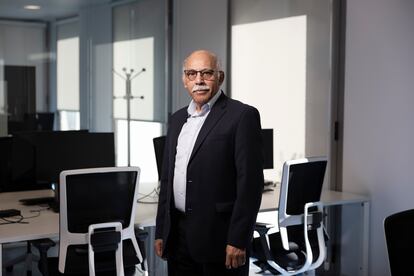Vijay Kumar, from MIT: ‘We want to democratize education with Open Learning, but those who take the courses already had training’
The former director of the Office of Educational Innovation and Technology is concerned about the consequences of the pandemic, which has caused many children to lose two years of studies

Vijay Kumar acted as a consultant when the Universitat Oberta de Catalunya (UOC), the first online-only university to open in the world, started operating, so he moves around its new Barcelona headquarters with the ease of someone who feels at home. Born in India, he graduated as a chemical and industrial engineer at the Madras Institute of Technology (MIT), although he has spent 27 years of his career at another, more famous MIT: the Massachusetts Institute of Technology, where he served as director of the Office of Educational Innovation and Technology and associate dean for Open Learning. He was the ideal candidate because he knew about technological innovations for education, after completing a degree in this subject at the University of Massachusetts Amherst. The first goal of the current director of the Abdul Latif Jameel World Education Lab at MIT is to open the doors of free distance education to everyone on the planet.
Question. What are you working on?
Answer. Open Learning. We see how we can use online technology to improve pedagogy and we apply it to programs and courses. We work with different educational institutions to build or change their innovation ecosystems and improve their capabilities to respond to market opportunities. We reflect on how to guide teaching to be more innovative, or on its relationship with industries.
Q. Can you give us an example?
A. We work with universities in Latin America, for example, to create new engineering programs, or in Latvia to transform their education system. We are working with the Riga Business School, the Riga University and the Riga Technical University to create an institutional incubator that launches health, hybrid and digital learning, or industry-focused PhD programs. MIT makes technology and has an organization, Open Learning, that helps people in colleges run the technology.
Q. Is training teachers in technology the key?
A. Not just training each one. We must create a community between teachers and students who support each other. It is very arrogant to think that everything you have done is right or good. Open training is old, but it still has the same purpose: to provide quality education for lots of people who otherwise don’t have access. In India, they started with online courses and now laboratory experiments are shown on television. There has been a progression.
Q. But the worldwide gap in training does not decrease.
A. Studies we have done show that the goal of Open Learning is to democratize learning, to reach everyone, but if you see the profile of those who take the courses, they already had training. You don’t reach everyone. Those who sign up want to do more things, better things. That means you have to create “gateway courses” that provide access to training.
I’ll give you an example. I advised the Bill and Melinda Gates Foundation on the Next Generation Learning Challenges project. A lot of colleges and institutions in the United States are very prohibitive, and we saw that books increased the cost a lot. So we said: if you shift it to openly available resources, the cost will go down. About 12 community colleges committed to always using open teaching materials that MIT offered [gateway courses] in math courses, and these free resources were healing for many; they prepared them to be able to continue. We must make sure that anyone can access school.
Q. The percentage of 10-year-old children who cannot read and understand a simple text increased from 57% to 70% after the pandemic, according to World Bank calculations.
A. I can think about a couple of reasons. One is that not all children have had access to the same learning possibilities. You are comparing apples and oranges, not apples and apples. The resources may also have existed [at school], but not the infrastructure to access them at home. And there was a lot of learning loss of other kinds. I’ll call this “dependencies.” Social support is important in the way one learns. Children are said to have lost the equivalent of two years of education. It’s a pity. And what can we do? There has to be consensus and priorities: what knowledge do we want to teach them?
Q. UNESCO is concerned because they say that the educational technology in the industry has too much power over the political decisions.
A. It’s an important caution. That’s why we launched edX [free online courses with Harvard University]. A few years ago I led the Open Knowledge Initiative [of the Andrew W. Mellon Foundation and the MIT]. The foundation originally wanted me to build an open source learning management system, and I wanted to go one layer below and include open specifications so that people can build many kinds of learning management systems.
Governance is very important to make sure that what you do [as a company] doesn’t go awry. If I’m a company, I want to think about social good, but I’m always thinking about the bottom line. Governance will make sure that the profit bottom line and the social impact bottom line are compatible.
Q. At what age do you think children should start using screens?
A. I have no opinion on that. The optimist in me says that their tolerance levels, their optimization function, is different than mine. I want to be mindful of that. I don’t want to be the typical paternalistic parent that says: “I want you to be happy exactly the way I want you to be happy.” Cartoons from the early days of computers come to mind, when people were just working, and this created the future shape of the human being.
Sign up for our weekly newsletter to get more English-language news coverage from EL PAÍS USA Edition
Tu suscripción se está usando en otro dispositivo
¿Quieres añadir otro usuario a tu suscripción?
Si continúas leyendo en este dispositivo, no se podrá leer en el otro.
FlechaTu suscripción se está usando en otro dispositivo y solo puedes acceder a EL PAÍS desde un dispositivo a la vez.
Si quieres compartir tu cuenta, cambia tu suscripción a la modalidad Premium, así podrás añadir otro usuario. Cada uno accederá con su propia cuenta de email, lo que os permitirá personalizar vuestra experiencia en EL PAÍS.
¿Tienes una suscripción de empresa? Accede aquí para contratar más cuentas.
En el caso de no saber quién está usando tu cuenta, te recomendamos cambiar tu contraseña aquí.
Si decides continuar compartiendo tu cuenta, este mensaje se mostrará en tu dispositivo y en el de la otra persona que está usando tu cuenta de forma indefinida, afectando a tu experiencia de lectura. Puedes consultar aquí los términos y condiciones de la suscripción digital.









































